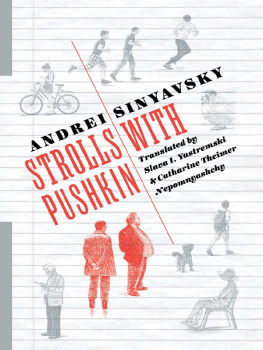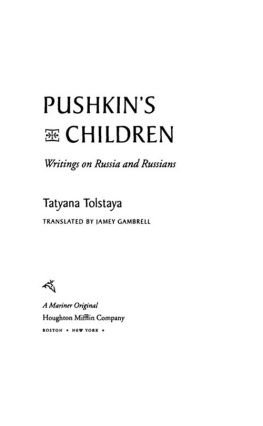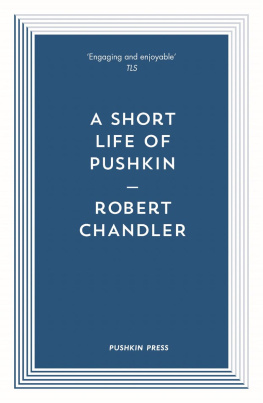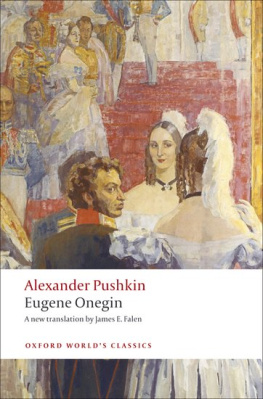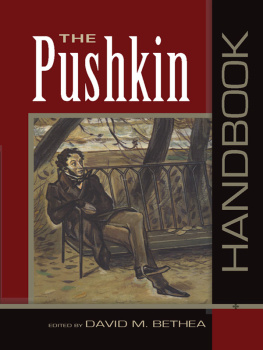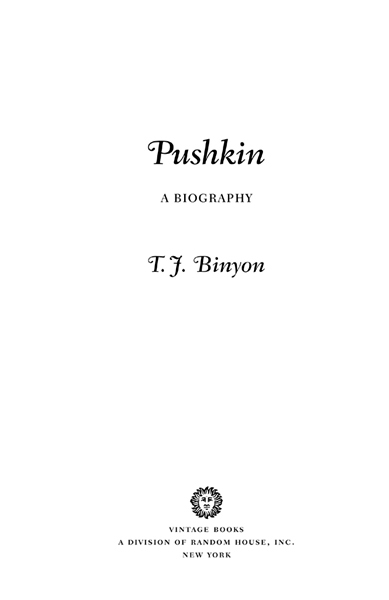INTERNATIONAL ACCLAIM FOR T. J. B INYONS
Pushkin
[A] monumental biography. Distinguished. Rewarding. [Binyon] is exact and discerning.
The Boston Globe
This stupendous biography is the crown of a lifes work. It is the best biography I have read, not just this year but in decades.
A. N. Wilson, Daily Mail
Binyons long-awaited life of Pushkin is by far the most important to appear in many years. It is a magnificent achievement, a monument to a life of scholarship.
Orlando Figes, The Times (London)
Scrupulously researched, lucidly and objectively written, with an admirable lightness of touch and a good dose of dry humour.
The Economist
In T. J. Binyon [Pushkin] has finally found the biographer he deserves. Pushkin remains immortal and he certainly lives again in this book.
Simon Sebag Montefiore, Mail on Sunday
One of the great biographies of recent times. Such is Binyons skill in presenting his phenomenal research, and so patiently does he build up the readers interest in the man and his era, that he ends by captivating us. The myths evaporate under Binyons scrutiny. [He is] a biographer of the first rank.
The New York Sun
Superb. Grippingly entertaining and magnificently authoritative.
The Daily Telegraph
In this magnificent biography, T. J. Binyon tells Pushkins story with the patience and finesse of a detective. The pace at which he leads the reader through the events of the poets short, strained life is careful, yet unfailingly riveting.
Evening Standard
Producing such a detailed yet absorbing chronicle of Pushkins adult life is a remarkable achievement. Binyons book is poignant, brisk, and at times downright funny: the best possible tribute to the changeable and elusively fascinating character of its subject.
The Guardian
Magnificent. Exemplary. Lavishly illustrated.
St. Louis Post-Dispatch
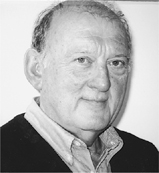
T. J. BINYON
Pushkin
T. J. Binyon lectures on Russian literature at Oxford University and is a senior research fellow at Wadham College. He is also the author of Murder Will Out, a history of the fictional detective, and two thrillers, Swan Song and Greek Gifts. He lives with his wife in Oxfordshire, England.
FIRST VINTAGE BOOKS EDITION, NOVEMBER 2004
Copyright 2002 by T. J. Binyon
All rights reserved under International and Pan-American Copyright Conventions. Published in the United States by Vintage Books, a division of Random House, Inc., New York. Originally published in Great Britain by HarperCollins, London, in 2002, and subsequently in hardcover in the United States by Alfred A. Knopf, a division of Random House, Inc., New York, in 2003.
Vintage and colophon are registered trademarks of Random House, Inc.
The Library of Congress has cataloged the Knopf edition as follows:
Binyon, T. J.
Pushkin : a biography / T. J. Binyon. 1st American ed.
p. cm.
1. Pushkin, Aleksandr Sergeevich, 17991837. 2. Poets,
Russian19th centuryBiography. I. Title.
PG3350.b55 2003
891.713 B 22
2003112113
eISBN: 978-0-307-42737-3
Author photographHelen Ellis
www.vintagebooks.com
v3.1
For Helen
and
In memory of my father
Denis Binyon
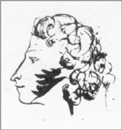
What business is it of the critic or reader whether I am handsome or ugly, come from an ancient nobility or am not of gentle birth, whether I am good or wicked, crawl at the feet of the mighty or do not even exchange bows with them, whether I gamble at cards and so on. My future biographer, if God sends me a biographer, will concern himself with this.
PUSHKIN , 1830
Contents
Illustrations
INTEGRATED ILLUSTRATIONS
Drawings by Pushkin reproduced courtesy of the Institute of Russian Literature (Pushkinsky Dom) / Petrushka, Moscow.
P LATE S ECTION 1
PLATE SECTION II
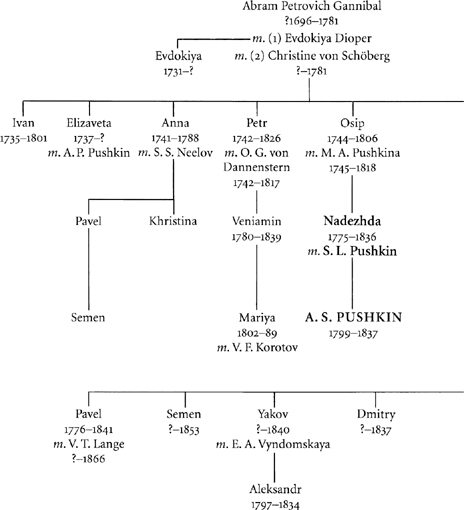
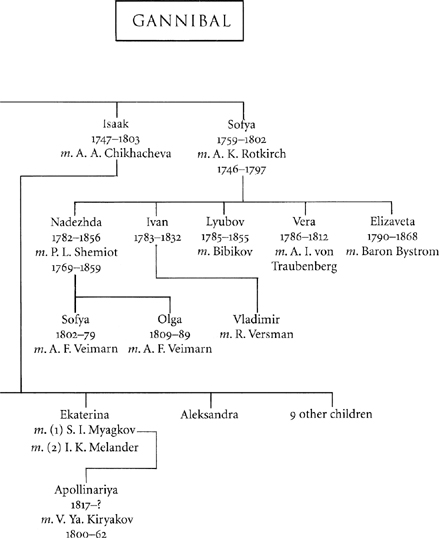
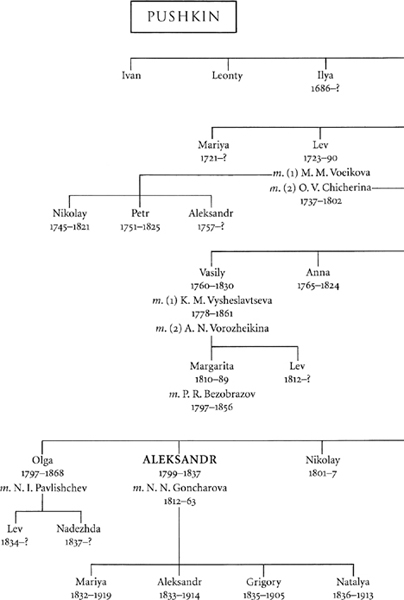
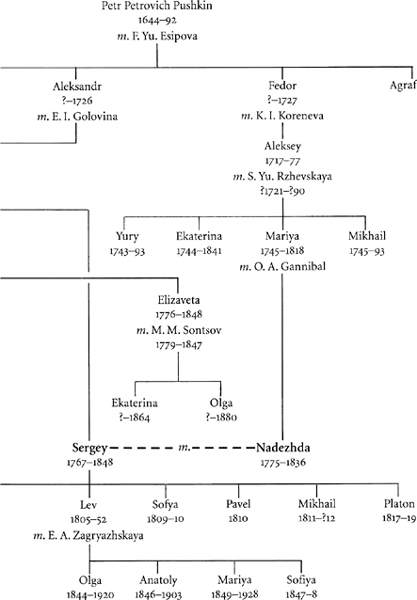
A Note on Translation, Transliteration, Dates, Currency and Ranks
All the translations in the text, both of Pushkins prose and his verse, are my own. I chose to retranslate his works, not from a presumptuous belief that my versions would be superior to all others, but in order that they might be uniform: Pushkin would at least speak with a single voice, however flawed this might be. No one could be more conscious of the deficiencies of the verse translations than I, or more aware of how much of the original they ignore. The primary aim, for the sake of which all others were disregarded, was to preserve the literal meaning of the original; at the same time I have endeavoured wherever possible to retain in the English line the content of the corresponding Russian line.
For the sake of readers without Russian a greatly simplified system of transliteration has been adopted, which, to avoid confusion, has been carried over into the notes and bibliography; scholars of Russian will, however, have no difficulty in reconstructing the Cyrillic original.
Since Russia used the Julian calendar, rather than the Gregorian, until 1917, it was eleven days behind Europe in the eighteenth century, twelve in the nineteenth and thirteen in the twentieth. To avoid the complication of giving all dates according to both calendars, the Russian Julian calendar has been used throughout, apart from a few dates referring to events in Europe, which are given according to the Gregorian and are followed by the notation (NS).
The monetary unit in Russia was (and is) the rouble, containing 100 copecks. Two types of rouble were in circulation, the silver and the paper (known as assignats). The value of the latterthat most often employed in financial transactionsfluctuated, but was generally about a quarter of that of the silver rouble. In 1835, when calculating the yearly expenditure of Byrons father in an article on the poet, Pushkin uses an exchange rate of 25 paper roubles to the pound sterling (XI, 275).
The Table of Ranks, by which Peter the Great had in 1722 systematized the hierarchies of the civil service, the army, the navy and the court, still remained in force in the nineteenth century. The fourteen civil and military ranks (omitting the naval and court equivalents) were the following:


